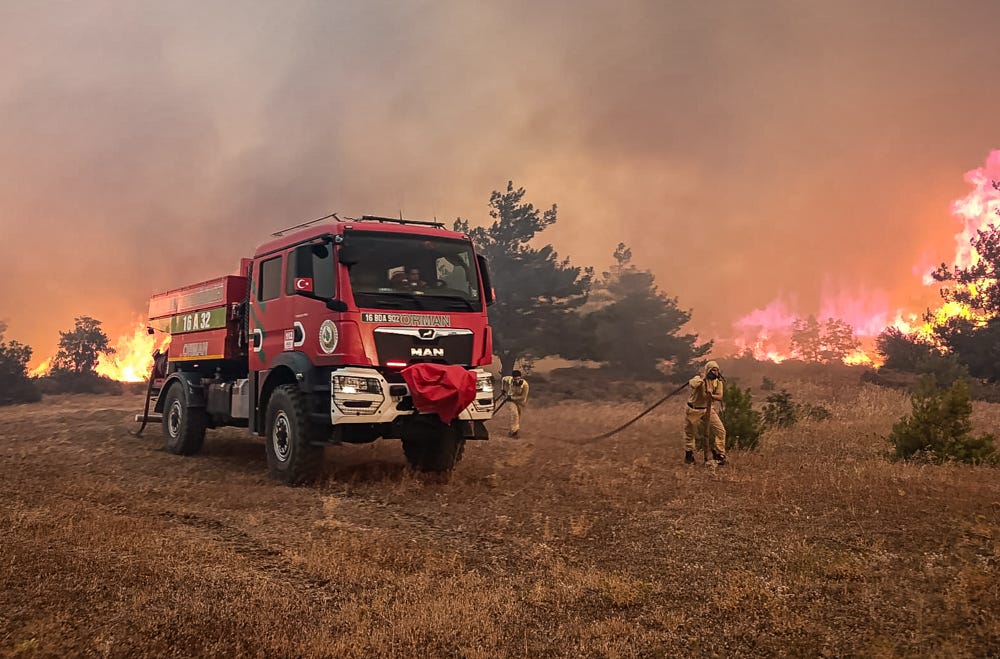Turkey saw record-breaking heat this week. And still, these guys put on Turkic warrior costumes to welcome Kazakh Pres. Kassym-Jomart Tokayev. The Turani of expectations?
In this week’s recap:
Forest fires intensify in Turkey
CHP joins peace commission amid nationalist backlash
Domestic and diplomatic wraps
Extreme heat melts brains, mainframes
Also from us this week:
Wouter Massink on how a late-spring frost is raising food prices in Turkey and beyond
Emily Rice Johnson delivered a timely timeline on Turkey-Iran relations
Monday: We host a webcast with FPRI’s Mohammed A. Salih to discuss how events in Syria impact Turkey-PKK negotiations. Join the livestream here at 1500 UTC.

Fire season in Turkey brings ingenuity, like using cement mixers and TOMA water cannon trucks to fight blazes. It also brings tragedy, as blazes have killed 17 people since late June.
Extreme heat and low humidity combined this week to fuel forest fires across Turkey, creating striking scenes in Bursa and forcing thousands to relocate throughout the region as intervention efforts continue.
Agriculture and Forestry Min. Ibrahim Yumaklı said emergency responders fought blazes in 84 locations Saturday, adding the country would remain on high fire alert until October.
Government officials also warned citizens to avoid activities like picnicking and flicking cigarette butts into the wild, stating human activity causes 90 percent of forest fires.
Meanwhile, the news cycle has focused on incidents involving apparent arsonists, including one man who reportedly started a fire “for fun” in Istanbul’s Beykoz district. Since June 1, nearly 150 people have been detained on suspicion of causing wildfires, Pres. Erdoğan stated Saturday.
Still, opposition lawmakers and climate experts maintain the state also bears responsibility for the fires, highlighting shortcomings in prevention efforts and policy decisions.
CHP Deputy Deniz Yavuzyılmaz Wednesday said power lines running through high-risk forested areas are not being adequately monitored, blaming the privatization of the energy sector.
"The main reason for electricity-related fires in Turkey's forests is the privatization carried out by the AK Party,” Yavuzyılmaz told reporters. “In the early 2010s … the area burned by electricity-related fires accounted for only 5 percent of the total burned area. After privatizations, this rate increased to 25 percent.”
"The one-man regime is the cause of this lack of oversight, incompetence and ineptitude regarding forest fires.”
Önder Algedik, a climate expert and author of the book, "Our Shared Issue: The Climate Issue", echoed similar criticism of Turkey’s presidential system, stating increased deforestation and mismanagement under Turkey’s General Directorate of Forestry (OGM) has exacerbated fire risks in recent years.
According to his calculations, the average area burned per forest fire was 3 hectares between 2012-2017. That figure rose to 13 hectares of damage per forest fire between 2019-2024.
“This shows OGM lost its forest fire prevention capacity because their new responsibility is just to cut trees,” Algedik told Turkey recap.
Algedik continued, saying the establishment of the executive presidency in 2018 increased commercial lumber production, which is overseen by OGM.
He said this shifted institutional resources away from routine fire prevention efforts, arguing the policy poses a greater fire threat than individual actions, which government officials have blamed for recent blazes.
“The problem is not that individuals are entering forests to have picnics, the problem is that the state enters forests with profit motives,” Algedik said. “Forests are not an economic issue, they are a climate change issue and we have to protect them.”

The brand canyon: CHP joins peace commission amid nationalist backlash


